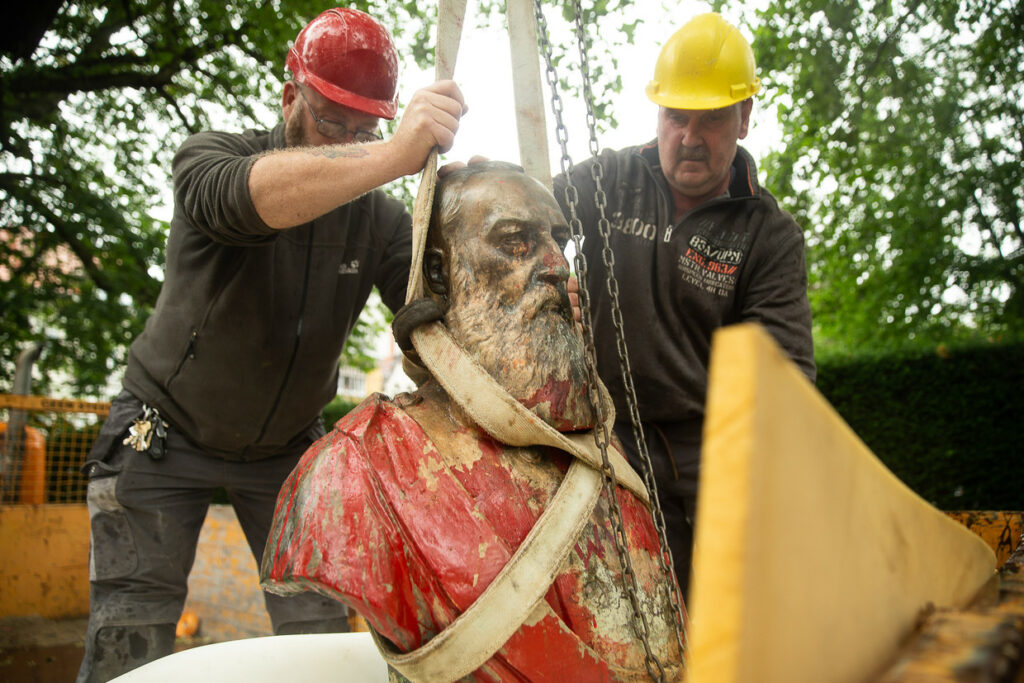Three politicians will be decorated with the Order of Leopold II on 30 June this year, but Belgium's Green parties consider it "indecent" that the order is named after the monarch who was responsible for many colonial cruelties in Congo.
This year, the Mayor of the Brussels municipality of Saint-Josse-ten-Noode Emir Kir, as well as former Belgian Ministers Eric Van Rompuy and Francis Delpérée are set to receive the Order of Leopold II, one of Belgium's three great national orders.
The decoration was created in 1900 as a colonial, civilian order. It has been one of Belgium's orders of knighthood since Congo's independence in 1960 and is reserved for politicians, civil servants, academics, military personnel or other citizens with a solid record of service in their field.
However, the Flemish and Francophone Green parties, Groen and Ecolo, are now questioning the name as well as the existence of that Order. "The Order of Leopold II is a legacy of the colonial period," said Federal MP for Groen Wouter De Vriendt, who is also the Chair of the Special Parliamentary Committee on the Colonial Past.
Congo Free State
"There is nothing wrong with meritorious Belgians being given a symbolic title of honour, but it is in bad taste to award an honorary title in the name of a head of state who has led an atrocious regime," he told De Morgen. "We want to discuss this in the Parliamentary Committee."
Between 1885 and 1908, King Leopold II ruled what was then called "Congo Free State," which was his personal property. The area largely corresponds to today's Democratic Republic of Congo.
Millions of Congolese people died under his brutal colonial rule. Following international criticism of the poor treatment of the Congolese, Leopold II had to give up his personal colonial state to Belgium in 1908.
However, Congo remained a Belgian colony until 1960 – a regime that was based "on a relationship of inequality that was unjustifiable," Belgium's King Philippe said during a state visit to the DRC last week, adding that the period was characterised by "paternalism, discrimination and racism" and "gave rise to misdeeds and humiliations."
Related News
- 'Deepest regret,' but no apology: King Philippe acknowledges colonial cruelties
- Belgium's King Philippe returns rare mask to DR Congo
- Belgium considers granting mixed-race children full access to colonial archives
Additionally, the date on which the Order of Leopold II is awarded this year, 30 June, is also extremely unfortunate, as it coincides with the date of Congo's independence, stressed De Vriendt. "That is downright painful and an insult to the self-confidence of the Congolese nation."
The parties state that the Order no longer has a place in 2022, at least not under this name.
"It is violent that this order still exists," Guillaume Defossé, Federal MP for Ecolo, told Le Soir, stressing that Leopold II's Congo Free State was "the scene of a reign of terror involving military occupation, oppression, looting, forced labour, corporal punishment, racism and exploitation."
"At the very least, a change of name for this title of honour is needed. It would be a small step, but it would have a great symbolic significance, as a sign of historical awareness," he said, adding that the order could be renamed the 'Order of Elisabeth.'
Not an honour, but an accusation
This is not the first time that the Order of Leopold II has been under discussion, as Nora Bertels, a city councillor in the Duffel municipality refused the title in 2021, and Frank Albers, professor of English literature (UAntwerpen) did the same in 2020.
"'Commander in the Order of Leopold II' is not an honorary title at all. In fact, it is an accusation," Albers wrote in an opinion in De Standaard at the time. Now, he told De Morgen that it was "very unfortunate" that his text had no effect at the time. "It is good that this is brought up for discussion."
Nadia Nsayi, political scientist and author of the book 'Dochter van de dekolonisatie' ("Daughter of the decolonisation") added that it is a good thing that Belgium has been paying attention to the figure of Leopold II for some years now.
"But we focus very strongly on this one figure and forget about other actors. It is not like Leopold II stood alone," she added. "Just as the Order of Leopold II is under discussion, the same should be true of other honours and prices for academics."

